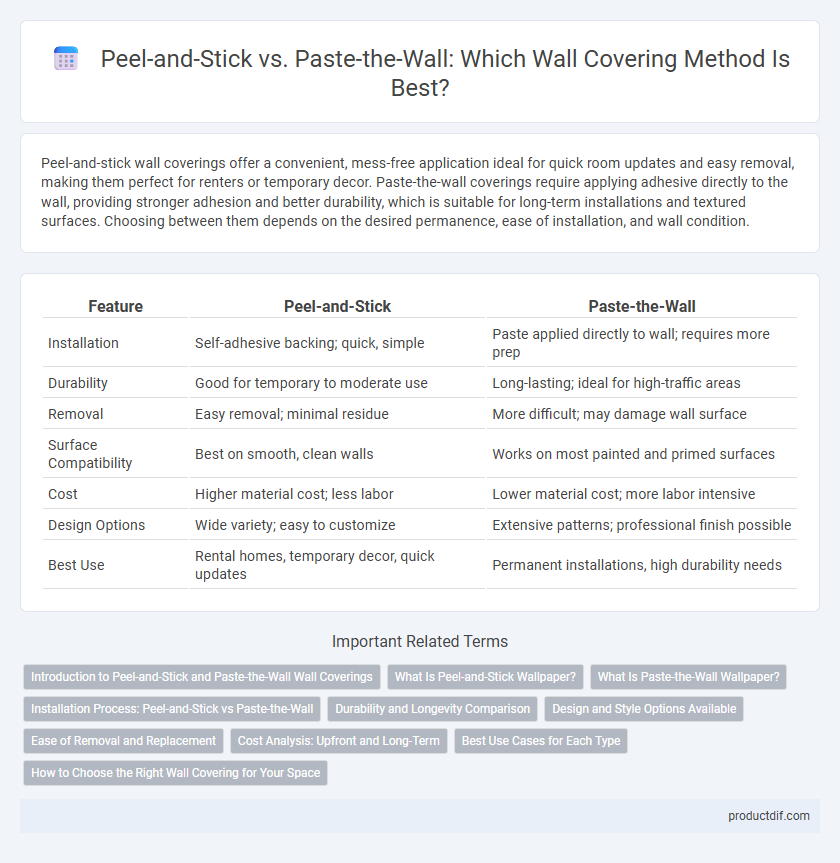Peel-and-stick wall coverings offer a convenient, mess-free application ideal for quick room updates and easy removal, making them perfect for renters or temporary decor. Paste-the-wall coverings require applying adhesive directly to the wall, providing stronger adhesion and better durability, which is suitable for long-term installations and textured surfaces. Choosing between them depends on the desired permanence, ease of installation, and wall condition.
Table of Comparison
| Feature | Peel-and-Stick | Paste-the-Wall |
|---|---|---|
| Installation | Self-adhesive backing; quick, simple | Paste applied directly to wall; requires more prep |
| Durability | Good for temporary to moderate use | Long-lasting; ideal for high-traffic areas |
| Removal | Easy removal; minimal residue | More difficult; may damage wall surface |
| Surface Compatibility | Best on smooth, clean walls | Works on most painted and primed surfaces |
| Cost | Higher material cost; less labor | Lower material cost; more labor intensive |
| Design Options | Wide variety; easy to customize | Extensive patterns; professional finish possible |
| Best Use | Rental homes, temporary decor, quick updates | Permanent installations, high durability needs |
Introduction to Peel-and-Stick and Paste-the-Wall Wall Coverings
Peel-and-stick wall coverings feature a self-adhesive backing that allows for quick and mess-free installation, making them ideal for DIY projects and temporary decor updates. Paste-the-wall wallpaper requires applying adhesive directly to the wall before hanging, which offers stronger adhesion and is better suited for textured or uneven surfaces. Both types provide a wide range of designs, but peel-and-stick options generally offer easier removal and repositioning compared to paste-the-wall products.
What Is Peel-and-Stick Wallpaper?
Peel-and-stick wallpaper is a self-adhesive wall covering designed for easy installation and removal without the need for additional glue or paste. Made from vinyl or fabric-backed materials, it offers a mess-free alternative to traditional paste-the-wall wallpaper, making it ideal for renters and DIY projects. Its repositionable nature allows users to adjust placement multiple times, ensuring a perfect fit and smooth finish on various wall surfaces.
What Is Paste-the-Wall Wallpaper?
Paste-the-wall wallpaper requires applying adhesive directly to the wall instead of the wallpaper backing, offering a cleaner and less messy installation process. This method enhances ease of use by reducing preparation time and minimizing wallpaper handling, making it ideal for DIY projects. Paste-the-wall wallpaper also tends to dry faster, promoting quicker room completion compared to traditional paste-the-paper methods.
Installation Process: Peel-and-Stick vs Paste-the-Wall
Peel-and-stick wallpaper offers a straightforward installation process by allowing users to directly apply the adhesive backing to clean, dry walls, significantly reducing preparation time. Paste-the-wall wallpaper requires mixing paste and applying it evenly to the wall before hanging the paper, which can be messier and more time-consuming. Both methods demand careful alignment for seamless results, but peel-and-stick wallpaper is generally favored for quick DIY projects and easy repositioning.
Durability and Longevity Comparison
Peel-and-stick wall coverings offer easy installation but typically have a shorter lifespan, with adhesive that may weaken over time in humid environments. Paste-the-wall wallpapers provide greater durability due to stronger adhesives and more robust materials, often lasting 10 to 15 years with proper care. High-quality paste-the-wall options resist peeling, fading, and moisture damage, making them ideal for long-term wall decoration.
Design and Style Options Available
Peel-and-stick wall coverings offer a wide range of modern designs, including textured, metallic, and vibrant patterns that cater to contemporary aesthetics. Paste-the-wall options provide more traditional and intricate styles, such as detailed murals and classic wallpapers with rich textures and colors. Both methods deliver diverse style versatility, but paste-the-wall tends to accommodate heavier, more complex designs suited for long-term installations.
Ease of Removal and Replacement
Peel-and-stick wall coverings offer superior ease of removal, allowing users to quickly lift and reposition without damaging walls, ideal for renters or frequent redecorators. Paste-the-wall wallpapers require wet application, making removal more labor-intensive and often leaving adhesive residue that demands thorough cleaning. Choosing peel-and-stick options enhances flexibility for updates, while paste-the-wall designs may provide a more permanent finish but complicate future replacements.
Cost Analysis: Upfront and Long-Term
Peel-and-stick wallpaper generally has a higher upfront cost due to adhesive backing and easy application technology but reduces installation expenses by eliminating professional labor. Paste-the-wall wallpaper tends to be cheaper initially but may incur higher long-term costs related to professional installation, maintenance, and potential damage during removal. Evaluating total cost of ownership involves comparing material prices, labor fees, and durability to determine the most economical choice for wall covering projects.
Best Use Cases for Each Type
Peel-and-stick wall coverings offer ideal use for quick, temporary decor updates or rental properties, as they are easy to install and remove without damaging walls. Paste-the-wall wallpaper suits long-term projects and textured or uneven surfaces, providing a stronger bond and more durable finish. Choose peel-and-stick for convenience and flexibility, while paste-the-wall excels in longevity and professional application.
How to Choose the Right Wall Covering for Your Space
Peel-and-stick wall coverings offer easy installation and removal, ideal for renters or temporary designs, while paste-the-wall options provide greater durability and seamless finishes for long-term applications. Consider the room's moisture levels, wall texture, and desired lifespan when selecting between these types. In spaces like kitchens or bathrooms, paste-the-wall wallpapers often perform better due to their stronger adhesion and water resistance.
Peel-and-stick vs Paste-the-wall Infographic

 productdif.com
productdif.com